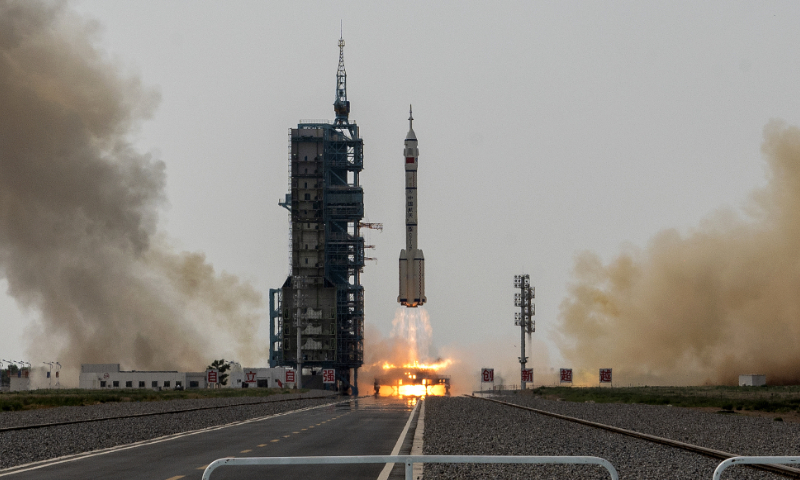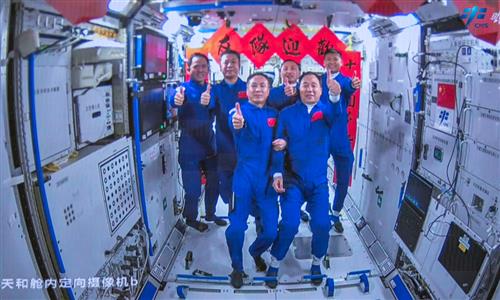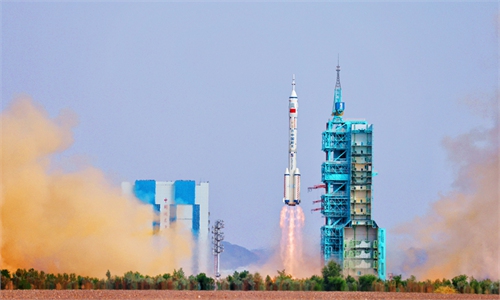The US should not conjecture China's space ambitions with skewed mindset: Global Times editorial

The Shenzhou-16 spacecraft onboard the Long March-2F rocket launches at the Jiuquan Satellite Launch Center on May 30, 2023 in Jiuquan, China. Photo: VCG
On the second day of the first commercial flight of China's self-developed large passenger aircraft C919, it was officially announced that China has initiated the lunar landing phase of its manned lunar exploration program, and the overall goal is to achieve China's first manned landing on the moon by 2030. On Tuesday, the Shenzhou-16 manned spaceship successfully entered its designated orbit. The three taikonauts aboard entered China's space station, recreating the famous scene of the "space get-together." Subsequently, the two Shenzhou crews will realize in-orbit crew rotation in China's space station.The nation's excitement due to the historic breakthrough in the aviation manufacturing industry has not yet dissipated, and there appeared great surprises in the field of China's human spaceflight. It is hard to express the Chinese nation's collective pride and sense of accomplishment as we watch our once-distant national dreams come true one by one.
Among the three-person crew of Shenzhou-16 is Gui Haichao, a 36-year-old professor from the School of Astronautics at Beihang University wearing glasses. He is a payload expert and a civilian taikonaut. This is the first for China's human spaceflight. During the space mission for space station application and development, the Shenzhou-16 crew will stay aboard the station for around five months, conducting in-orbit tests and experiments on space science and application payloads. This indicates that China's scientific research in space has entered a new and more tangible starting point. Such a step is crucial and has unlimited future possibilities.
Compared to aviation, the exploration of the vast universe in the aerospace industry represents the highest and farthest reaches achievable by human science. Since its inception, it has held significance for all of humanity, embodying the pinnacle of precision and cutting-edge technologies. It not only satisfies the primal and fundamental curiosity and desire for exploration of the unknown world but also generates increasingly powerful impetus for technological innovation and application.
It is important to emphasize that China has always been committed to the peaceful use of outer space. Every advancement and breakthrough in China's aerospace industry not only belongs to China but also the world. This is not mere rhetoric. China has long announced its openness to all United Nations member states for cooperation in the Chinese Space Station, actively implementing the spirit of collaboration. China's progress in space exploration comes at a time when the world's space exploration efforts have relatively stagnated, which has injected a powerful energy and ignited a wave of space exploration, creating a positive ripple effect.
Not all countries share the same level of vision as China. While China's aerospace industry is rapidly advancing, the US, on one hand, has closed its doors to space cooperation with China. It not only excludes China from the International Space Station but also imposes technological restrictions on China. On the other hand, it goes even further by introducing more militaristic elements into space.
According to a report from the Guardian, Brigadier General Jesse Morehouse, the deputy director of strategy, plans, and policy at US Space Command, recently made a chilling statement regarding China's vision for space development and the so-called "provocations" by Russia. He said, "If someone was to threaten the United States of America, or any of our interests … we are ready to fight tonight." This statement inadvertently reveals their true intentions.
Indeed, the US military is ready for the militarization and weaponization of space, posing a substantial threat to the peaceful use of space. The US Space Force's budget request for the fiscal year 2024 reached $30 billion, a year-on-year increase of 15 percent. This is the largest budget request ever made for this branch and continues the trend of significant growth in recent years. It is ironic that the US lacks genuine interest in peaceful space exploration. Even the Apollo moon landings in the 1960s and 1970s were driven by the desire to compete with the Soviet Union. When it found that the cost-benefit ratio of maintaining US hegemony was not favorable, Washington immediately turned to the more aggressive "Star Wars" program.
After the end of the Cold War, the budget of the National Aeronautics and Space Administration (NASA) was repeatedly slashed, and its exploration of space seemed to lose momentum. It was not until China's aerospace advancements raised concerns in Washington that the budgets of NASA and the US Space Force began to increase year by year. What does this indicate? It shows that the initial intentions of US space exploration were misguided, and now they are using this same skewed mindset to assess China's space ambitions.
In December 2022, the 77th session of the United Nations General Assembly passed two resolutions jointly proposed by China and Russia: "No first placement of weapons in outer space" and "Prevention of an arms race in outer space." On the occasion of the launch of the Shenzhou-16 spacecraft, we once again call on the international community, particularly the US, to reach a consensus on negotiating relevant treaties as soon as possible.
Neil Armstrong's words after landing on the moon, "That's one small step for a man, one giant leap for mankind," still resonate with us, evoking both admiration and respect. However, it must be said that the subsequent actions of the US in space exploration have betrayed and disappointed these words.


